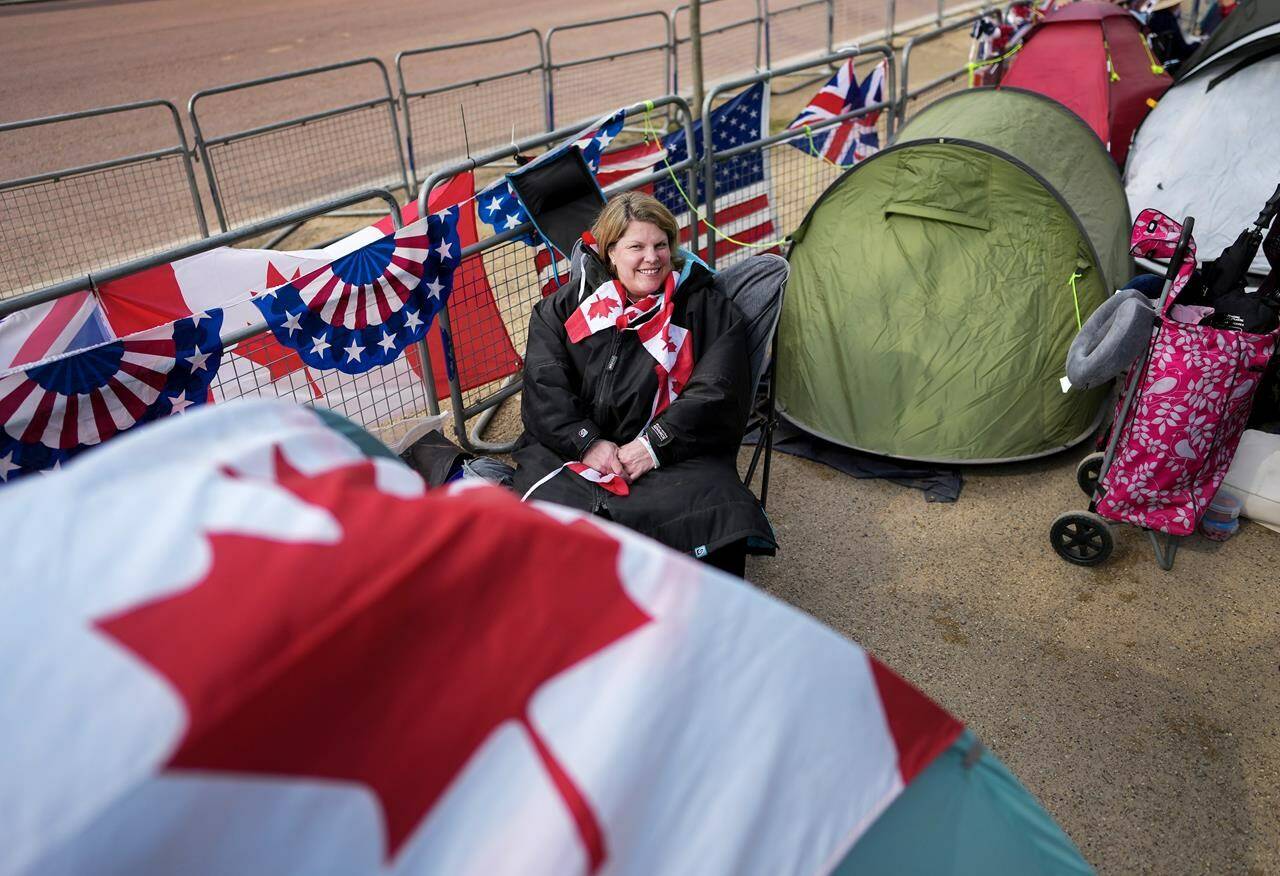Canadians were joining the crush of jubilant royal fans who were converging on London on Friday, ahead of the first coronation to take place in the United Kingdom in 70 years.
Flag-draped tents were lined three deep along the road to Buckingham Palace as royal fans from all over the world donned fancy hats and plastic crowns, sipped champagne and took photos with cardboard cutouts of King Charles.
Over a dozen members of the Monarchist League of Canada gathered in front of a statue of King George VI — the first reigning monarch to visit Canada — where they unfurled a huge Canadian flag. They then laid bouquets of red and white flowers at the base of the monument and sang “O Canada.”
Sally Harris, from Ottawa, said it was important for her to witness the moment in history. She said the monarchists are hoping to watch the coronation procession under a big Canadian flag and wave at the King and Queen Consort as they go by.
“King Charles is the King of Canada and it was very important for me to be here because I think that in my lifetime this is the only coronation I’ll ever see, so I wanted to be a part of it,” she said.
She said the scene outside the palace was “like a party,” with a safe and celebratory feel.
Security was heavy near the palace, where workers were setting up giant screens to show the coronation, as well as medical tents, bathrooms and designated quiet spaces.
The occasional thundershower didn’t dampen the enthusiasm of the crowd, although it didn’t do much to improve the appearance of the cardboard cutouts of King Charles and Camilla, the Queen Consort.
A big cheer went up from the crowd when they were rewarded with a glimpse of the real thing, as King Charles and his wife were seen leaving the palace in a motorcade.
Several of the tents lining the Mall — the route to the palace — were festooned with maple leaf flags. A mini Canadian camping section was formed by royalists from Nova Scotia, New Brunswick and Ontario, who met at the queen’s funeral last year.
Futher down, Lynne Paterson had also draped her small tent with flags. The Toronto resident said she’d gotten her love of the royals from her mother, “who must have owned 60 books” about the family.
“I think (the royal family) give stability, and I think because I lived in Britain it’s different, they’re just such a part of the fabric,” said Paterson, who spent several years in London. “And obviously the Queen worked so hard and I really admired that.”
Canada’s official delegation to Saturday’s coronation includes Prime Minister Justin Trudeau, Governor General Mary Simon, as well as several Indigenous leaders, two astronauts, and several representatives of youth organizations.
Outside of that delegation, there will also be other attendees from Canada, including musicians from the Regina Symphony, who will play in a coronation orchestra.
There will also be 21-year-old Jay Patel, who was able to get a job as a cook at the CN tower through the Canadian arm of the King’s charity, the Prince’s Trust. Patel said he was stunned at the invite.
“There was no chance in the world I (had thought) I would wake up and get a call from the CEO saying, ‘are you interested in going to a coronation,’” said Patel, who came to Canada in 2021 as an international student from India.
The Indigenous members of Canada’s delegation include the leaders of the Assembly of First Nations, the Inuit Tapiriit Kanatami and the Métis National Council, who were granted a rare audience with the King on Thursday.
Chief Perry Bellegarde, the former national chief of the Assembly of First Nations and honorary president of the Royal Canadian Geographic Society, said it’s important for Indigenous people to witness the coronation due to their treaty relationship with the Crown.
More recently, he said King Charles, then Prince of Wales, was given a traditional name in 2001, in Saskatchewan, which translates to “The sun watches over him in a good way” in Cree.
Bellegarde, who has worked with the monarch, believes that King Charles “has showed and demonstrated a willingness to listen, but as well to open doors and convene and bring parties together to have difficult conversations.”
While reconciliation is a long process that is far from complete, he believes the King has earned his Indigenous name, due in part to his commitment to the environment and willingness to tackle climate change.
“What better person to head up the Commonwealth than somebody who’s already doing that?” he said in an interview near Buckingham Palace. “To me, that’s hope for the future.”
—Morgan Lowrie, The Canadian Press
READ MORE: How to watch the coronation: Canadian broadcasters ramp up coverage ahead of crowning

